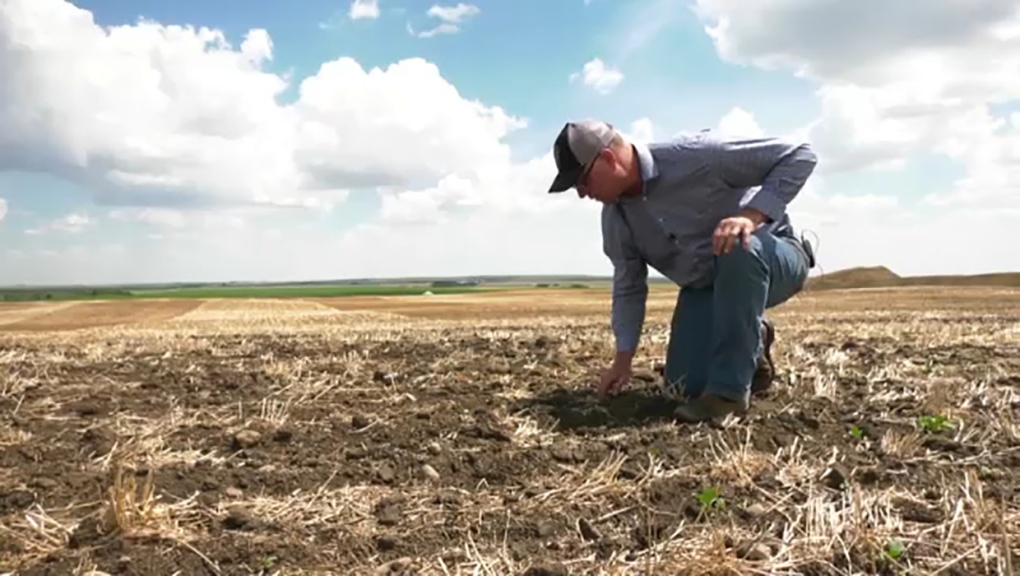Heat spell, dry season hurting western Alberta crops
The extreme heat and lack of precipitation is being felt on farms across Alberta, and there's a high probability of it hurting this year's yield.
The quasi-drought is noticeable south of Red Deer and gets even worse south of Calgary, where many regions were already short of moisture as far back as last year.
That left farmers planting in dusty ground this spring, and barring a meteorological miracle, a lot of those crops won't mature in the summer.
"This is weather we're used to in August," Gladys Ridge farmer Leroy Newman said. "We've never seen it in June like this."
On Newman's farm, thousands of acres of hay, wheat, barley, peas and canola have taken a beating.
Some seeds haven't yet germinated.
"I don't know if you could justify even cutting (what's there)," he told CTV News Thursday.
 On Leroy Newman's farm, thousands of acres of hay, wheat, barley, peas and canola have taken a beating.
On Leroy Newman's farm, thousands of acres of hay, wheat, barley, peas and canola have taken a beating.
The latest provincial Agricultural Moisture Situation Update said many crops may be experiencing early signs of moisture stress.
"Currently," the late April report reads, "moisture reserves are extremely low across many areas and timely rains are more important now than ever. Many areas have received well below normal rainfall, a condition that persists since at least Aug. 1."
"We've had a couple times of rain this year and it's just not enough to sustain a crop where there's no subsoil moisture," Newman said. "The soil is usually like a big sponge: it soaks all the moisture and holds it in for these dry heats waves. We just haven't had any reserve for the last four years."
"A lot of areas in Alberta and Saskatchewan are into our third or fourth year of normal than drier conditions," Todd Lewis with the Canadian Federation of Agriculture said. "It's frustrating. There's not much you can do as a farmer if it doesn't rain."
One bright spot for producers is that commodity prices are currently high, which means there is still money to be made.
But with increasing overhead costs on farms, this Alberta heat spell could be felt in Canadian cities soon enough.
Less production typically results in higher prices being passed down to the consumer.
CTVNews.ca Top Stories

What to know about avian influenza in dairy cows and the risk to humans
Why is H5N1, or bird flu, a concern, how does it spread, and is there a vaccine? Here are the answers to some frequently asked questions about avian influenza.
'I was scared': Ontario man's car repossessed after missing two repair loan payments
An Ontario man who took out a loan to pay for auto repairs said his car was repossessed after he missed two payments.
opinion The special relationship between King Charles and the Princess of Wales
Royal commentator Afua Hagan writes that when King Charles recently admitted Catherine to the Order of the Companions of Honour, it not only made history, but it reinforced the strong bond between the King and his beloved daughter-in-law.
New Norad commander calls Canada's defence policy update 'very encouraging'
American troops will be spending more time training in the Far North, the new commander of Norad says, a strategy that fits 'hand-in-glove' with Canada's renewed focus on Arctic defence.
$70M Lotto Max winners kept prize a secret from family for 2 months
During a special winner celebration near their hometown, Doug and Enid shared the story of how they discovered they were holding a Lotto Max ticket worth $70 million and how they kept this huge secret for so long.
Are Canadians getting sick from expired food?
A new survey by Dalhousie University's Agri-Food Analytics Lab asked Canadians about their food consumption habits amid rising prices.
Documents reveal Ottawa's efforts to get Loblaw, Walmart on board with grocery code
It was evident to the federal government as early as last fall that Loblaw and Walmart might be holdouts to the grocery code of conduct, jeopardizing the project's success.
Charlie Woods, son of Tiger, shoots 81 in U.S. Open qualifier
Charlie Woods failed to advance in a U.S. Open local qualifying event Thursday, shooting a 9-over 81 at Legacy Golf & Tennis Club.
Improve balance and build core strength with this exercise
When it comes to cardiovascular fitness, you may tend to focus on activities that move you forward, such as walking, running and cycling.
































